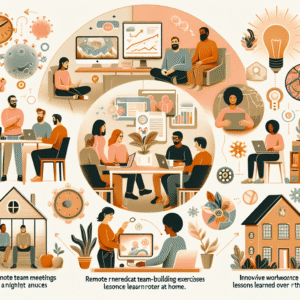The Future of Remote Work

The Future of Remote Work
Our understanding of traditional work is being challenged like never before. Technology and shifts in the global economy continue to re-define the boundaries of what it means to be a workplace. Quite arguably, the center stage amidst these changes is being taken by remote work.
Historically, companies expected their employees to be stationed at their offices for a set number of hours each day. However, advancements in technology, employee’s needs for flexible schedules and now global pandemics have aided in shifting the paradigm to accommodate remote work. Do these changes signal the future of work and could remote work be the ‘new normal’?
The Digital Direction
As is evident in the last decade, businesses are becoming more digital. With the proliferation of powerful digital tools and platforms, teams can flip the switch to remote work without losing productivity. Collaboration tools like Slack, project management applications like Asana and versatile video conferencing software like Zoom have made remote work feasible and effective. As technology continues to improve, we can expect to see even higher productivity rates in remote work settings.
The Eco-conscious Employee
Remote work signifies more than just logistical convenience – it’s environmentally conscious, too. By reducing commute, we contribute less to air pollution, traffic congestion, and the demand for fossil fuels. This standout aspect of remote work might be the propeller that fast-forwards its adoption in the times ahead.
Balance of Work and Life
Remote work is not just about work; it’s about life too. It lets employees attain a desirable work-life balance, allowing for a richer, more satisfying life. Remote work lets you meet family obligations, pursue a hobby or simply work in an environment that is most conducive to your productivity. The prospect of designing one’s work and life could make remote positions more attractive in the future.
Global Talent at Hand
Companies adopting remote work policies have an advantage that traditional companies can’t match – access to a global talent pool. Instead of being limited by geographical constraints, businesses can now hire the best candidate for the job, no matter where they are located. As we move forward, we can expect to see an increase in geographically distributed teams.
Caution: Challenges Ahead
While the future of work seems to point towards remote work, it’s crucial to recognize the challenges that lie ahead. Dealing with isolation, maintaining company culture, data security and managing diverse time zones are just a few of the hurdles that need to be overcome to make remote work truly mainstream.
The Road Ahead
Ultimately, the future of work is not about remote work or office work, but about flexibility. Flexibility in where we work, how we work, and when we work. With the right tools, the right culture and the right mindset, businesses can embrace this change and build stronger, more resilient teams.
* The post is written by AI and may contain inaccuracies.


